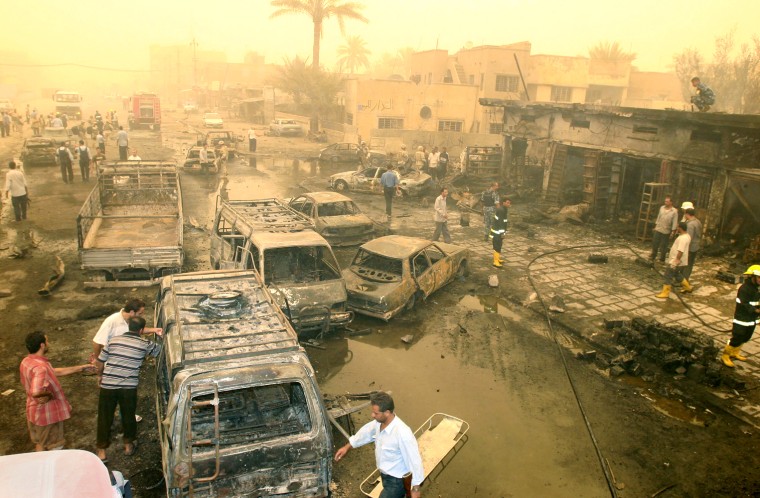Sunni Arab members of a committee drafting Iraq's new constitution ended their boycott Monday, six days after jeopardizing the credibility of the nascent political process by walking out in protest over the assassinations of two fellow Sunni constitution framers.
Their decision to return eased the threat that the country's new constitution would be a product of only two of three major Iraqi ethnic and religious groups. Leaving out the Sunni Arabs, who form the core of the insurgency, would dim hopes for a political exit from the incessant violence gripping the country.
On Monday, a minibus packed with explosives detonated at a checkpoint outside a hotel once used by American contractors, killing at least 12 people and injuring at least 18, hospital officials and police said.
Also, a U.S. soldier was killed Monday when a roadside bomb exploded under his vehicle near Samarra, 60 miles north of Baghdad, the U.S. command said. The soldier was assigned to Task Force Liberty, which oversees security in a large area of the infamous Sunni Triangle, the main center of the insurgency.
At least 1,778 members of the U.S. military have died since the Iraq war began in March 2003, according to an Associated Press count.
39 killed over the weekend
On Sunday, a truck bomb blew up outside a Baghdad police station, killing at least 39 people. Many of the victims survived the initial blast but died from their burns in the hospital overnight. That was the deadliest single attack in Iraq in a week.
Sunni Arab participation in the drafting of the constitution is considered essential in order to win the influential minority's approval for the charter. The draft must be approved by parliament by Aug. 15 and submitted to the voters in an October referendum. If voters in any three of Iraq's 18 provinces reject the charter by a two-thirds majority, the constitution will be defeated.
The Sunnis said they were suspending participation in the committee to protest Tuesday's assassination of Sunni committee member Mijbil Issa and adviser Dhamim Hussein al-Obeidi.
But following the assassinations, the 12 remaining Sunnis demanded an international investigation into the killings, better security and a greater Sunni role in deliberations. It was not clear whether all their demands had been accepted.
Six of the 12 Sunnis rejoined their colleagues Monday morning at the closed-door meeting, said Baqir Hammoudi, secretary to Humam Hammoudi, the head of the committee.

Sunni member Ali al-Mishhedani said the others were absent because they lived too far from Baghdad or had other personal commitments. He said the others were expected in Baghdad later in the day.
Saleh al-Mutlaq, another Sunni member, said the Sunnis would meet Tuesday to review the charter's preliminary draft.
One of the subcommittees working on constitutional articles involving "rights, freedoms and responsibilities" announced agreement on several issues. The new language will state that all Iraqis are equal under the law "regardless of sex, race, origin, color, religion, sect, belief or opinion" and bans discrimination based on those categories.
Iraqi constitution draft focuses on families
The draft articles also affirm the family as "the nucleus of society and the state should preserve its values and religious and patriotic principles." It also bans child labor, violence within the family and guarantees "a balance between the role of women in the family and her work in society."
Most of the victims of Monday's minibus bomb were believed to have been private Iraqi security guards employed by the Sadeer Hotel, which the al-Qaida in Iraq terrorist group once described as the "hotel of the Jew."
In March, Abu Musab al-Zarqawi's group purportedly posted a video on a Web site showing a huge explosion at the Sadeer that killed four and wounded 40 others, including 30 American contractors.
About three hours after the hotel attack, a second suicide bomber targeted a former Saddam palace being used by the Ministry of Interior police command, killing at least two and injuring 10. The attacker drove into the main entrance of the palace, police said.
That large explosion around 8:40 a.m. shook downtown Baghdad and sent up black plumes of smoke.
In other violence Monday, gunmen killed a family of four in Samarra as they waited on the street for a ride in the tense city north of Baghdad. Subhi Thamir Hussein al-Badri, his wife and two sons were gunned down, police Lt. Col. Ayoub Mahmoud said. The reason for the killing was unclear, police said.